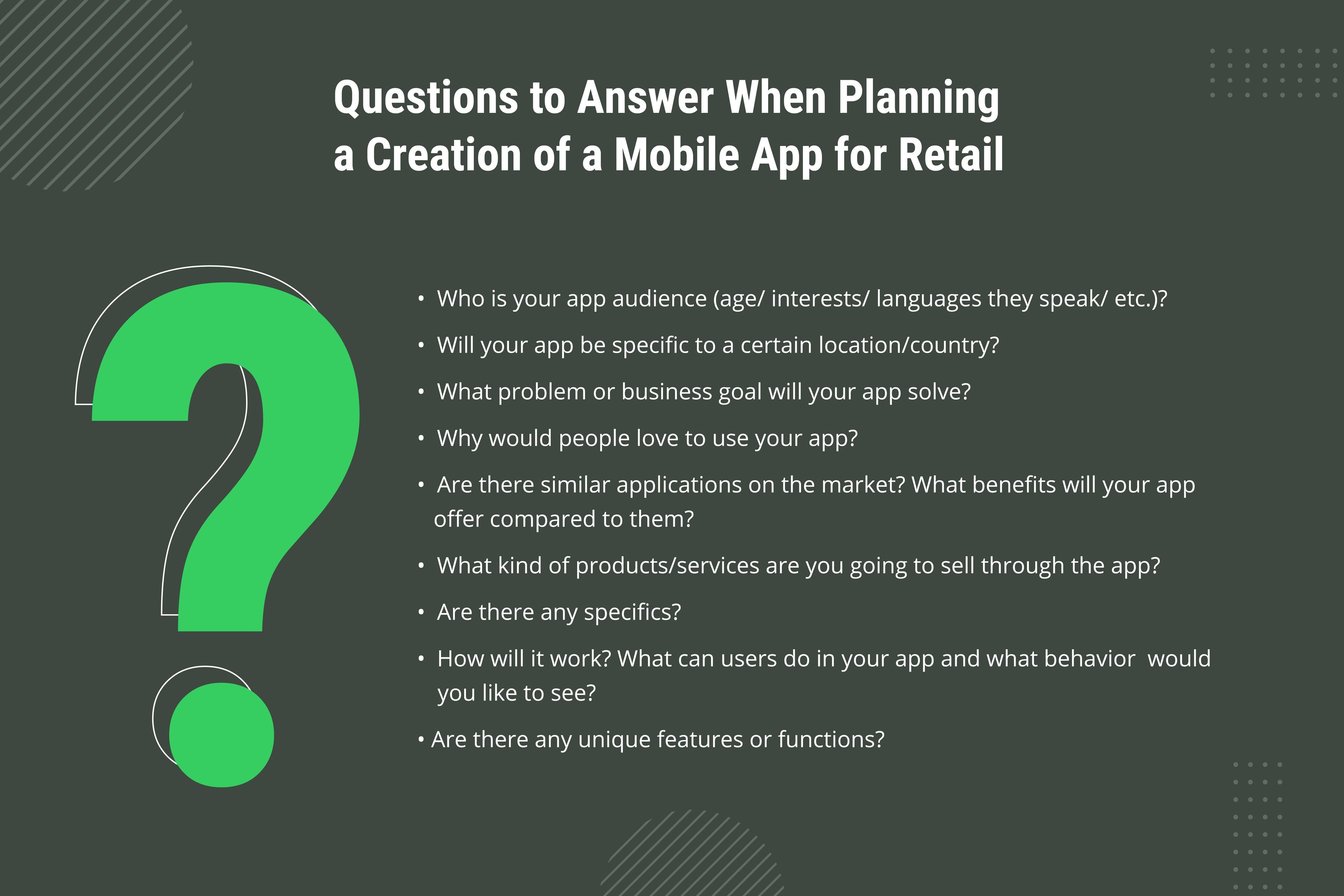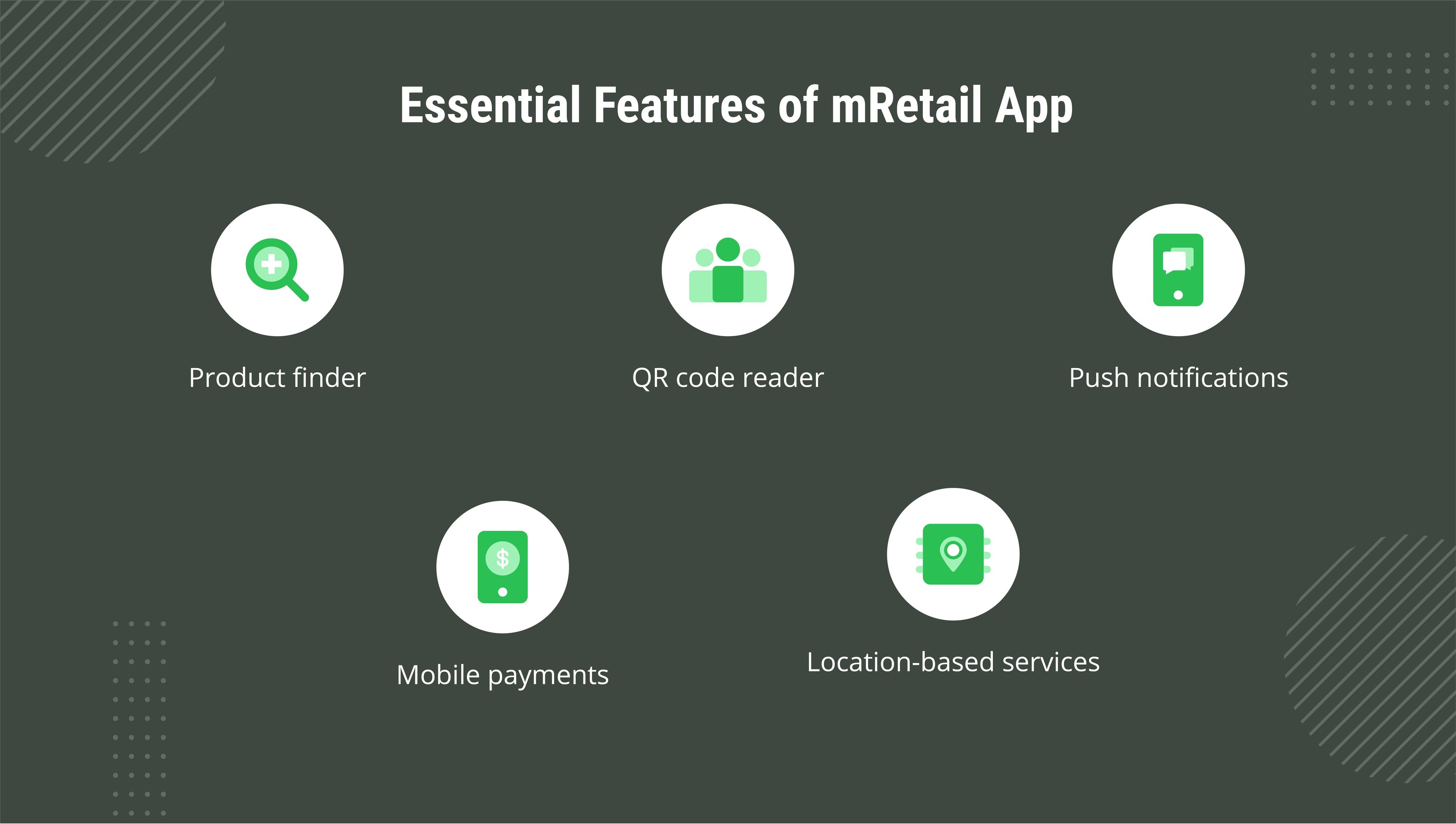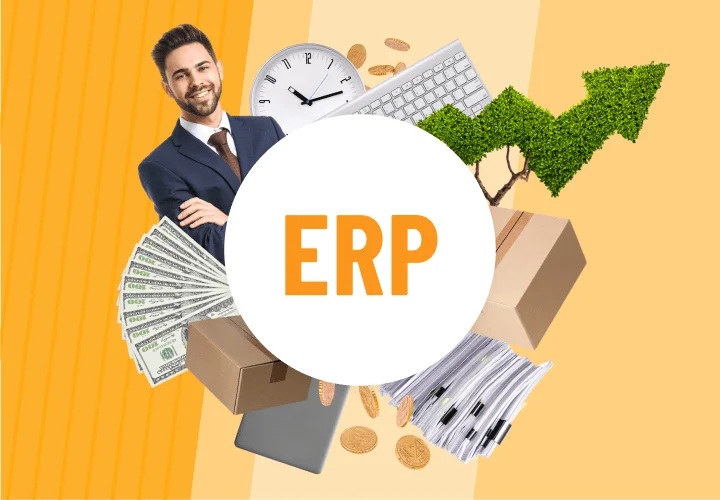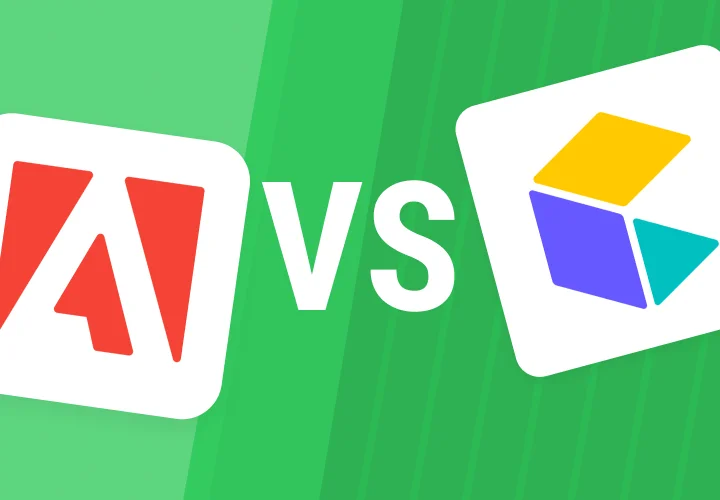How to Create a Mobile App for Retail to Modernize Your Business
Table of contents
- Benefits of Mobile Apps for Offline Retail
- How a Retail App Helps to Improve Your Business
- Coverage of Wider Audience
- Boosted Sales
- Increased Loyalty to Brand
- Streamlined Payment and Checkout
- Analysis of Customer Behavior
- Enhanced Customer Service Capabilities
- How to Create a Retail App and Features to Look For
- So How Much Does It Cost to Develop a Retail App?
- Size and Scale of the App / Feature Complexity
- Hourly Rates for Design and Development (Location & Expertise)
- Testing and Debugging (Quality Assurance - QA)
- Final Thoughts and Future Outlook (2025-2030)
Let's start by acknowledging that e-commerce is arguably one of the largest markets intrinsically linked with digitalization. And when it comes to mobile commerce (m-commerce), this market continues to demonstrate impressive growth. According to recent estimates, the global Compound Annual Growth Rate (CAGR) of the mobile commerce market is projected to be between 15% and 20% for the period from 2024 to 2028. It is expected that by 2025, the global mobile commerce market volume will exceed $4 trillion USD and will constitute a significant portion of the total e-commerce volume.
Looking at regional dynamics, the following can be noted:
- North America: Stable growth is projected with a CAGR in the range of 12-16% over the next few years.
- Europe: Solid growth in mobile commerce is expected with a CAGR of 14-18%.
- Asia-Pacific (APAC): Remains the growth leader, demonstrating a CAGR within the range of 18-25%, with China and India being key drivers.
- Middle East and North Africa (MENA): Significant growth in mobile commerce is observed with a projected CAGR of 16-20%, driven by increasing smartphone penetration and the development of digital infrastructure.
- South America: Shows promising growth rates with a CAGR in the range of 15-19%, facilitated by the increasing use of mobile internet.
Thus, despite the global growth trend, the pace of mobile commerce development varies significantly by region. The Asia-Pacific region continues to be the growth engine, while other regions such as North America and Europe are showing more moderate but steady growth. Developing markets like MENA and South America also demonstrate significant potential and dynamic growth.
Benefits of Mobile Apps for Offline Retail
Today we witness a common belief that offline retail is becoming a thing of the past and with each passing day gets replaced with online shopping. And while there are grounds for this belief, such as data showing that 51% of all Americans prefer to shop online, the truth is that most retail business owners still profit from owning offline shops. How?
The answer can be represented by data provided by Retail Dive, which states that the ability to touch, test, and see the product in offline shops is a crucial competitive advantage that the brick-and-mortar model has over online shops. Still, there are some changes in customer behavior retailers need to address.
For example, research by Business.com shows that two-thirds of people who shop offline get used to checking the product's price online before buying it. And things are not just in the price. People love the feeling of keeping pace with the times, and it's given by technological solutions, together with an extra convenience added to the top of the cake.
So how can a retail app help offline businesses to get closer to their customers?
In addition to the aforementioned benefits, mobile apps for retail also facilitate enhanced customer engagement and increased customer loyalty. Mobile apps provide a direct and persistent communication channel, allowing retailers to interact with their customers in real-time.
Beyond direct communication, mobile apps facilitate personalized experiences through tailored recommendations and exclusive offers.
Mobile apps also play a crucial role in driving sales growth and establishing new revenue streams. The convenience of shopping anytime and anywhere through a mobile app caters to the fast-paced lifestyles of modern consumers, increasing the potential for impulse purchases.
Finally, a dedicated mobile app strengthens a retailer's brand presence and provides a significant competitive advantage. A well-designed app, aligned with the brand's identity and communication strategy, acts as a constant brand ambassador on customers' devices.
How a Retail App Helps to Improve Your Business
There are far more ways in which a retail business can benefit from owning their own app, whether the talk is about improved sales, loyalty, or the ability to take advantage of data analytics. Now, let’s take a look at the advantageous essentials offered by mobile apps leveraged in retail.
Coverage of Wider Audience
The development of a mobile app for your retail business allows you to expand your horizons by reaching not just those people who live close to your shop location or accidentally walk somewhere nearby but everyone who has and uses their mobile phone.
A mobile app transforms your business from a local storefront into a globally accessible platform. Potential customers can learn about your products and services, explore your inventory, and make purchases from the comfort of their homes, at work, during their commute, or anywhere else in the world. This is particularly relevant in today's world, where mobile devices have become an integral part of daily life.
Boosted Sales
If you need proof that mobile apps contribute to increased sales, take a look at numbers:

- Mobile app users' add-to-basket rate is 90% higher.
- The overall conversion rate is about 120% higher on retail apps than on websites and other platforms.
These figures speak volumes about how effectively mobile apps guide users through the sales funnel, from initial interest to making a purchase.
One of the key factors driving this sales growth is the immediate accessibility of your store to customers anytime, anywhere. Unlike physical stores with limited operating hours or websites requiring a browser to be opened, a mobile app is literally at the user's fingertips, ready for use whenever they have a need or desire to make a purchase. This 24/7 availability significantly increases the likelihood of impulse buys and allows customers to complete transactions at their most convenient time.
Furthermore, a mobile app provides an effective channel for implementing and promoting loyalty programs. Timely communication to your audience about bonus points, discounts for regular customers, exclusive offers, and other rewards encourages repeat purchases and increases the average order value. Loyalty programs implemented through a mobile app offer greater interactivity and personalization, making them more appealing to users and, consequently, contributing to increased sales and the strengthening of long-term customer relationships. Ultimately, a mobile app becomes not just a sales tool but a powerful means of building a loyal customer base and sustainable revenue growth.
Increased Loyalty to Brand
There are various ways in which an m-retail app adds to your brand prominence: it's in loyalty programs that increase interest among your customers in using your app, or in the access to the exclusive content. The latter can be represented by some kind of in-app currency, like stars in the Starbucks app. The idea is the following: your customers get this currency for every visit to your store, every purchase, or for taking part in activities offered by your company. Later, they can use this in-app currency to pay for goods or receive discounts.
Streamlined Payment and Checkout
Optimized payment and checkout processes are another key area where a retail app contributes to business improvement. Features like one-click purchasing, digital wallet integration (e.g., Apple Pay, Google Pay, PayPal), and secure payment gateways simplify the transaction process, significantly reducing cart abandonment rates. By offering multiple payment alternatives, including credit cards, virtual wallets, and mobile payment methods, retailers can cater to a wider range of customer preferences, ensuring a smooth and hassle-free checkout experience. This efficiency in the payment process not only enhances customer satisfaction but also directly impacts conversion rates and sales. Furthermore, the rise of Buy Now, Pay Later (BNPL) solutions and the increasing adoption of cryptocurrency payments will make their integration into retail apps crucial for catering to evolving consumer preferences in 2025-2030.
Analysis of Customer Behavior
One of the most useful things an m-retail app has on offer is access to purchase statistics that allows analyzing shopping data of each individual client. You can use this data for the creation of personalized offers that hit the target because they’re based on information about previous purchases and current Browse requests. Leveraging AI-driven analytics allows for deeper insights, uncovering meaningful patterns in customer behavior beyond surface-level data.
More statistics that adds to personalization of offerings includes:
- Average time spent in the app
- Shopping cart abandonment rate
- The time between adding an item to a cart and purchasing it
- Browse history and product views
- Interaction with marketing campaigns
Enhanced Customer Service Capabilities
Finally, a retail app can significantly enhance customer service and support. Retailers can provide in-app chat support, comprehensive FAQs, and troubleshooting guides, offering customers immediate assistance whenever needed. Store associates can be empowered with customer profiles and purchase history through the app, enabling them to provide more tailored and personalized service interactions. The app can also streamline returns management by offering digital receipts and enabling customers to initiate return requests directly within the app. The adoption of AI-powered chatbots and virtual assistants will further revolutionize in-app customer support, providing 24/7 assistance, handling routine queries, and offering personalized recommendations, while allowing human agents to focus on more complex issues. These enhanced customer service capabilities improve customer satisfaction, build loyalty, and contribute to a positive brand reputation.
How to Create a Retail App and Features to Look For
Mobile app development is quite similar to the creation of a blockbuster: if you want it to be terrific, you need professional assistance. And one of the possible options is to outsource mobile app creation to a software company with a good track record in retail app development, the one that can take you through all stages of retail app development.
Still, even when cooperating with a trusted technology partner such as your fellow Emerline, an important piece of ‘work’ still remains on your side, and it’s in the provision of answers to questions that will help your provider create a clear picture of what exactly you want to make your brightest ideas come to life.
So what are these questions?
- What specific problem will your app solve for your customers or your business?
- What is your target audience for the app? (e.g., demographics, tech-savviness, shopping habits)
- What are the core functionalities (MVP features) that are absolutely essential for the initial launch?
- What unique features or value propositions will differentiate your app from competitors?
- What platforms do you want your app to be available on (iOS, Android, or both via cross-platform development)?
- How do you plan to monetize the app (if applicable)?
- What is your approximate budget and timeline for the project?
- How will the app integrate with your existing retail systems (inventory, CRM, POS, ERP)?
- What are your long-term goals and vision for the app (future features, scaling)?

Having clear answers to these questions is important because it will help a software development company give you an accurate estimate for your project.
Now, addressing the last question in the list, let’s look at the essential features of a modern retail app, so you can create a picture of what it should look like. It will be easier for you to plan some unique features ahead.

Product finder
If your business offers a lot of different products, it's wise to include a smart search function into your app, so that your users will be able to find products they want under certain characteristics (color, size, collection, etc.) and avoid endless and annoying scrolling through all the pages of the catalog. One more good feature that your users might admire is a camera-based visual search, allowing them to upload images to find similar products. AI-driven search will become standard, enabling more sophisticated and seamless results based on natural language queries and visual input.
QR code reader
With the help of a QR code scanning feature, your customers will be able to find all the important information about the product (its price, reviews, shopping rates) within seconds. People do appreciate such things, as they don’t just save time but also contribute to a much greater level of satisfaction with the shopping experience.
Push notifications
If you want your customers to be aware of all promotions and news, as well as ensure that they receive personalized offerings on time, a push notification feature is what you need. To reap more benefits from notifications, you can make your notifications interactive, suggesting your customers take certain actions, for example, for information gathering purposes that, again, can be transformed into more personalized offerings. AI-powered personalization engines will ensure notifications are highly relevant and contextually triggered (e.g., based on location, weather, past purchases, or abandoned cart items).
Mobile payments & Digital Wallets
Because there are different ways in which your customers prefer to pay for the products or services, it's important to integrate your retail mobile app with all the leading payment services, including PayPal, Apple Pay, Android Pay, Google Pay, and the growing number of BNPL (Buy Now, Pay Later) options. Support for cryptocurrency payments may also become a differentiating factor.
Location-based services (Geofencing & Beacons)
One more way to keep your customers close to your business and inform them of all the special offers ASAP is through the use of geofencing and iBeacons. This technology ensures that the information comes to the user in the right place at the right time: for example, sending greetings when a customer enters the store, offering products based on previous purchases, or providing real-time store navigation.
AR and Virtual Try-On
A critical feature for modern retail apps, AR allows customers to virtually try on clothes, place furniture in their homes, or preview products in 3D. This significantly enhances the shopping experience, boosts customer confidence, and reduces return rates.
AI-Powered Personalization & Recommendations
Beyond basic recommendations, AI algorithms will analyze extensive customer data (Browse history, purchase patterns, preferences, even real-time behavior) to deliver hyper-personalized product suggestions, dynamic pricing, and tailored offers. This will be a core expectation for consumers in the coming years.
In-App Live Chat & AI Chatbots
Providing immediate customer support through integrated chat features, often powered by advanced AI chatbots with human fallback options, will be essential for resolving queries quickly and enhancing customer satisfaction.
Loyalty Programs & Gamification
Deep integration of loyalty programs, including points systems, reward tiers, exclusive in-app content, and gamified challenges, encourages repeat purchases and strengthens brand loyalty.
Omnichannel Integration
Apps for retailers must ensure a consistent and seamless user experience for shoppers, no matter which way of making a purchase they choose — mobile, online, or in-store. This requires robust integration of the retail store apps with the retail store website, inventory management, point-of-sale (POS), CRM, and other systems used in a retail company. This allows for features like Buy Online, Pick Up In Store (BOPIS), in-store returns for online purchases, and unified customer profiles across all touchpoints. The app may also need a comprehensive admin panel to manage app users, add new products, view stats, manage loyalty programs, and more.
To conclude this part, let’s point out that apps for retailers have to ensure a consistent user experience for shoppers, no matter which way of making a purchase they choose — mobile, online, or in-store. This requires integration of the retail store apps with the retail store website, inventory management, and other systems used in a retail company. The app may also need an admin panel to manage app users, add new products, view stats, etc.
So How Much Does It Cost to Develop a Retail App?
This is the question that many clients ask software companies, and the answer is that the cost of development can range from a few thousand dollars for a basic app to hundreds of thousands of dollars for a complicated, savvy solution. In 2025, custom mobile app development averages around $171,450.
So what are the key factors that define the cost of building your retail app?
Size and Scale of the App / Feature Complexity
It is quite obvious that the more features you want to add, the more advanced these features are, the more devices and platforms the app should be designed for (native iOS/Android vs. cross-platform like React Native or Flutter), the more integrations with third-party services are needed, and the more elaborated app management system is required, the higher the app development cost is. Simple MVPs (Minimum Viable Products) with basic features (e.g., user login, product Browse, simple shopping cart) can range from $25,000 to $60,000. Medium complexity apps with personalized recommendations, loyalty programs, and payment gateway integration generally fall within the $60,000 to $150,000 range. Complex apps featuring custom integrations, advanced functionalities like augmented reality or AI-powered chatbots, and sophisticated designs can exceed $150,000 and may even reach upwards of $300,000 or more. E-commerce applications specifically often cost between $100,000 and $180,000, with complex solutions reaching over $250,000.
Hourly Rates for Design and Development (Location & Expertise)
Though the size and scale of the app define the time needed to make it, the rates of developers vary significantly based on location and expertise. For instance:
- North America: $100-$250 per hour
- Western Europe: $70-$150 per hour
- Eastern Europe: $35-$70 per hour
- Asia (e.g., India/Pakistan): $25-$50 per hour
So, with the same timeframe and level of quality, the final cost for building an app can vary significantly from one company or region to another. UX design can start at $5,000, while UI design typically ranges from $10,000 to $25,000, with complex designs exceeding $80,000.
Testing and Debugging (Quality Assurance - QA)
Although design and development account for the majority of expenses, testing also constitutes a notable part of an app creation budget, typically 15-20% of the total cost. QA & testing is required both as a part of the development process to ensure continuous monitoring of all possible issues, as well as before the app’s release to check that all requirements are met and to ensure a seamless, bug-free user experience. This phase can add an extra $20,000 to $35,000.
In any case, it is not possible to give an estimate for creating a hypothetical retail app. Every project has its specifics and requires an individual approach. The more details you provide to the developers, the more realistic estimate you will get. So if you have an idea of developing an app and want to know how much it will cost you, you can always reach our specialists for an estimate.
At Emerline, we know how to make retail app development right, leverage the power of innovations, and ensure the design that will make your customers want to use your solution. One of the more recent projects we delivered to a company operating in retail is an AR shopping app that allows customers to forget about shopping nightmares and make an easy choice from a variety of options with augmented reality used as a ‘try it on’ tool.
You can learn more about the product and the process of its development to create a clearer picture of how we can contribute to your business success. And always feel free to contact us, for price estimation, consultation, or any other questions you want to clarify in terms of retail app development services.
Final Thoughts and Future Outlook (2025-2030)
As we move towards 2030, mobile apps for retail will continue to evolve beyond simple transactional tools. They will become central to an omnichannel strategy, seamlessly blending online and offline experiences. The integration of AI will lead to truly hyper-personalized shopping journeys, while AR/VR and immersive technologies will transform how customers interact with products before purchase. Cybersecurity will remain paramount, and sustainable practices will increasingly influence partnership choices. For retailers, investing in a sophisticated mobile app is no longer just about keeping pace; it's about pioneering the future of customer engagement and loyalty in an increasingly digital-first world.
Updated on Jul 10, 2025





